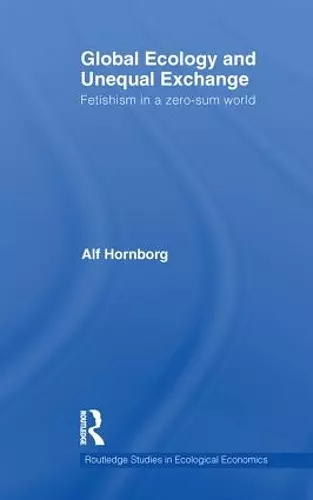Global Ecology and Unequal Exchange
Fetishism in a Zero-Sum World
Format:Hardback
Publisher:Taylor & Francis Ltd
Published:30th Jun '11
Currently unavailable, and unfortunately no date known when it will be back
This hardback is available in another edition too:
- Paperback£45.99(9780415659284)

In modern society, we tend to have faith in technology. But is our concept of ‘technology’ itself a cultural illusion? This book challenges the idea that humanity as a whole is united in a common development toward increasingly efficient technologies. Instead it argues that modern technology implies a kind of global ‘zero-sum game’ involving uneven resource flows, which make it possible for wealthier parts of global society to save time and space at the expense of humans and environments in the poorer parts.
We tend to think of the functioning of machines as if it were detached from the social relations of exchange which make machines economically and physically possible (in some areas). But even the steam engine that was the core of the Industrial Revolution in England was indissolubly linked to slave labour and soil erosion in distant cotton plantations. And even as seemingly benign a technology as railways have historically saved time (and accessed space) primarily for those who can afford them, but at the expense of labour time and natural space lost for other social groups with less purchasing power. The existence of technology, in other words, is not a cornucopia signifying general human progress, but the unevenly distributed result of unequal resource transfers that the science of economics is not equipped to perceive. Technology is not simply a relation between humans and their natural environment, but more fundamentally a way of organizing global human society. From the very start it has been a global phenomenon, which has intertwined political, economic and environmental histories in complex and inequitable ways. This book unravels these complex connections and rejects the widespread notion that technology will make the world sustainable. Instead it suggests a radical reform of money, which would be as useful for achieving sustainability as for avoiding financial breakdown.
It brings together various perspectives from environmental and economic anthropology, ecological economics, political ecology, world-system analysis, fetishism theory, semiotics, environmental and economic history, and development theory. Its main contribution is a new understanding of technological development and concerns about global sustainability as questions of power and uneven distribution, ultimately deriving from the inherent logic of general-purpose money. It should be of interest to students and professionals with a background or current engagement in anthropology, sustainability studies, environmental history, economic history, or development studies.
‘Writing with clarity and analytical focus, Alf Hornborg takes on our most serious problems today: the degradation of the environment and the unequal distribution of wealth. Going beyond the usual stories about equal exchange, he shows how resources from labor to energy are unequally transferred across the globe to the detriment of the environment and equity: our narratives about the benefits of growth and efficiency hide the realities of human and material debasement. Drawing on anthropology, Hornborg persuasively argues that by distinguishing money’s several purposes through issuing multiple currencies, and by adjusting our tax and subsidy policies, we may reduce our footprints and cope more sensibly’.
- Stephen Gudeman, University of Minnesota, USA
"We view technology as akin to magic, creating value from nothing. Blending culture and ecological economics, Alf Hornborg shows that technical development is actually a zero-sum game. Technology transfers assets between countries, producing wealth in some regions while imposing labor and environmental costs elsewhere. All the while, money makes material resources invisible. Civilization, concludes Hornborg, has been built on the displacement of environmental damage. This book should be read by all persons concerned with technology, development, and trade".
- Joseph Tainter, Utah State University, USA
This is a wonderful volume on world historical ecology [...] Ecological degradation and the race for natural resources has played a central role in human socio-cultural evolution for millennia and in the capitalist world-system for centuries. This book helps us to understand the human past and to devise a collectively rational future.
- Christopher Chase-Dunn, University of California, Riverside, USA
ISBN: 9780415614863
Dimensions: unknown
Weight: 540g
208 pages